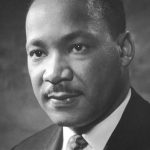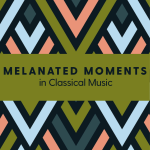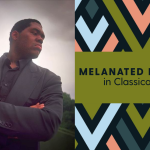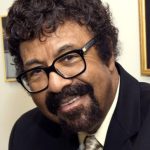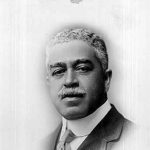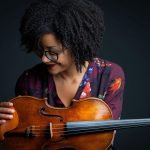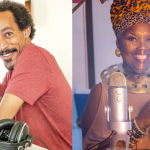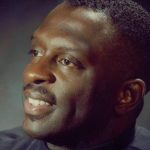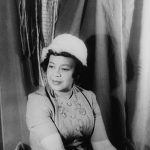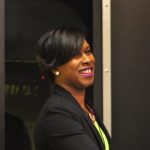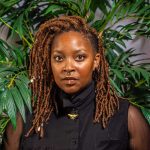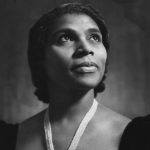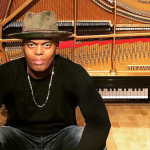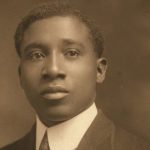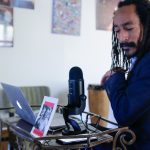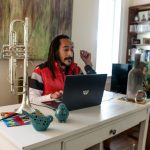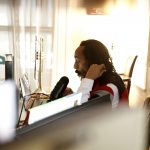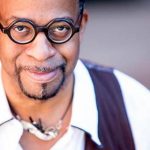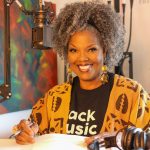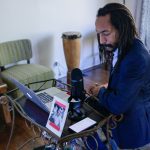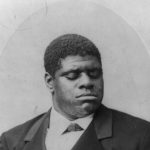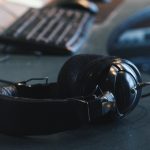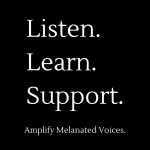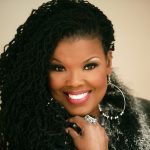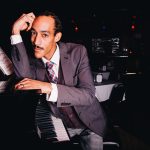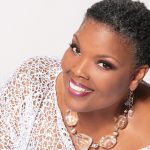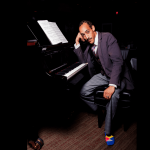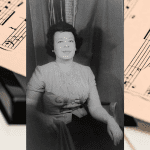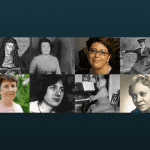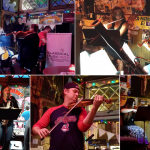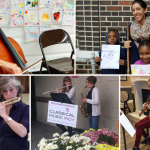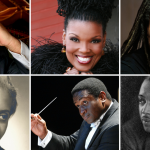MMCM S3E8: Castle of Our Skins – Ashleigh Gordon
Angela and Joshua wrap up Season Three with a flourish by speaking with solo and collaborative violist Ashleigh Gordon. She is recognized internationally as an effective social change agent through education. Ashleigh reflects on her journey as a musician and how she endeavors to center and celebrate the works of Black artists and composers through her Boston-based organization, Castle of Our Skins.
Featured Music:
“The Negro Speaks of River,” by Margaret Bonds, arranged by Ashleigh Gordon
“Vivace from String Quartet No. 1,” by Adolphus Hailstork
Joshua Thompson (00:00): Before we get started with this episode, we wanted to thank everyone for your amazing support of this podcast. As our podcast community grows, we have added resources for each episode. So just visit our website to access blog posts and transcripts for each episode or follow us on social media and email us anytime with your podcast suggestions to melanatedmoments@classicalmusicindy.org. Music Plays (00:34): [MMCM Theme] Joshua Thompson (00:43): Greetings and salutations to everyone out there in our growing listening audience. I’m Joshua Thompson… Angela Brown (00:49): And I’m Angela Brown. And welcome back to another episode of Melanated Moments in Classical Music. Joshua, it seems like every season, honey, we both introduce a special guest that just has us over the top excited! Joshua Thompson (01:06): [Laughter] Indeed, we absolutely do. I know you’ve already had a few this season and guess what? Angela Brown (01:11): What, baby?– Joshua Thompson (01:11): I’ve got my guest supreme for Season Three today, honey. Oh- Em- Gee, I am so geeked about this one! Angela Brown (01:20): Well, now I am here for your enthusiasm! Joshua Thompson (01:23): And I’m glad that you are, and I’m hoping our audience is here for some fantastic music and an interview with one of the country’s most versatile, impactful, and intentional artists on the classical music scene. Angela Brown (01:37): Well, honey, you know they are! And I know why you’re so excited. You actually had an opportunity to meet our guest, for the first time, not too long ago. Am I correct? Joshua Thompson (01:49): You are correct. This was back in March of 2020. I was in Boston completing my Beckmann Emerging Artists fellowship, essentially acquiring resources to help me expand my own work. And I had the great fortune to learn from this extraordinary human resource over several plates of the most delicious Ethiopian food you could ever imagine. Angela Brown (02:14): Okay, now, wait a minute. Joshua, you know how I am when you start talkin’ about food, child. I get hungry! So, Let’s just make sure that we stay right on course and let’s talk about the guest today! Joshua Thompson (02:23): Right, I got you. I am sincerely honored to welcome violist, artistic director, and just all-around dope human being, Ashleigh Gordon. So let me tell you a little bit about Ashleigh. Angela Brown (02:35): Woohoo! Come on. Joshua Thompson (02:36): So, Ashleigh has received degrees in Viola performance from The New England Conservatory and Baldwin Wallace University Conservatory of Music. She completed her master’s at The International Ensemble Modern Academy, which is a yearlong program in Germany that focuses on the study and performance of contemporary music. Like, that’s not too bad of a master’s program. Angela Brown (02:59): Not at all. Joshua Thompson (03:01): Ashley is described as a charismatic and captivating performer, and she has performed on stages the world over. I’m talking London, Berlin, Frankfurt, Switzerland, Paris, Hong Kong, Bulgaria– just a few. And she’s presented lectures on citizen artistry, entrepreneurship, and workshops for fellow educators and students at Gettysburg College in Pennsylvania, Keene State College in New Hampshire, Oberlin College Conservatory of Music in Ohio, and at The North Carolina Governor’s School for the Arts. Angela Brown (03:36): All right now, Ms. Ashleigh! Ya better be out here working, girl! Joshua Thompson (03:41): Listen and I haven’t even begun to talk about her massive presence in Boston and the Boston, Massachusetts Arts Community. So, she served as Viola Instructor for the Boston Youth Symphony Orchestra. She’s been featured in The Boston Globe. She was the 2016 Charles Walton Diversity Advocate Award winner from The American Federation of Musicians– was a 2020 Americans for the Art, The Johnson Fellowship Nominee– just a myriad of touchpoints where she’s impacted her community and is also the co-founder and artistic director of the Boston-based nonprofit Castle of Our Skins. This is an organization that’s born out of the desire to foster cultural curiosity, and they celebrate Black artistry through music and classrooms and concert halls. And they really invite the exploration of Black heritage and culture by centering unsung and celebrated figures from past and present. So, let me stop talking and help me welcome this incredible woman. Welcome to Melanated Moments in Classical Music: Ashleigh Gordon! Ashleigh Gordon (04:52): Oh my goodness. Thank you. I have never had such an introduction! Joshua Thompson (04:57): Well, you crafted it. You did it. We just talking about you, that’s all! Ashleigh Gordon (05:02): Well, thank you. I’m excited to be here and to chat with you both. Joshua Thompson (05:05): Yes. Yes. We’re glad you could take time out of your busy schedule, and we have lots to cover. So, let me just dive right in. You know me. I ask all the questions. I’m curious– reading through your bios– I don’t know if this is strategic: you don’t necessarily mention where you were born, or when, or how this whole thing got started. So, I’ll ask: where, and when do you recall this passion for music and/or classical music starting for you? What was that defining moment? Ashleigh Gordon (05:33): Yeah, sure. Um, well I am the youngest of three kids, so kind of whatever the oldest did, I got the hand me downs cause it’s– that’s how it works! And my family is all Jamaicans. I’m first-generation American. And– recently learned that my parents and grandparents and extended family, either as a church organist or singer in the church choir or playing piano in the church or something or other, it goes quite back, having music and appreciation for performance, very much so on both sides of my family. So that I recently learned that it’s sort of in my blood. Um, and definitely with being part of a Caribbean household of “work hard” and having a good sense of discipline and all of those things, studying music is definitely a way to follow rules and, you know, practice at certain times. So, in terms of the discipline aspect, I think there was a real attraction. And also, again, this sort of family, blood sort of aspect of this as well, too. So as a kid, I ended up taking piano, which my older brother and my older sister did. Again, all the people in my family had taken piano. And I remember as a young young kid getting– maybe I was like five or something like this– getting a guitar. And it was one of those guitars that was plastic. I think it was white and had red buttons and you can push it and the whole thing would light up; probably was taller than I was. But I would always try to hold it on my shoulder, like a violin. And that’s the first memory that I have. I have no idea how I knew of the violin or, sort of, where that came into my life, but I definitely knew that piano was not my instrument. And I very much wanted to take violin. I started in public school, so shout out to public school music education, which we very much still need! And I like to say: in college, the Age of Reason hit me, where I learned that viola is actually the superior of the two instruments. And this is more in alignment with who I am as a person and how I want to engage with music and others. So, uh, piano, violin, and, uh, now, rightly so, switched over to Viola. Angela Brown (07:52): Wow… So, I think this will be a good time for us to sit back and listen to some of your virtuostic prowess on the viola, as we listen to “The Negro Speaks of Rivers” by Margaret Bonds. Music Plays (08:24): [Margaret Bonds- The Negro Speaks of Rivers] Angela Brown (11:44): Ugh! Joshua Thompson (11:50): Yay! Angela Brown (11:51): Gorgeous, gorgeous– Joshua Thompson (11:53): Absolutely. You know, Ashleigh, I haven’t had the pleasure of seeing you perform live yet, which is a shame, but ever since I met you last year, I have scoured the inter-webs for as many performances of yours– and you have such poise and grace and such a way with your instrument. It is, absolutely, just so awesome to hear you play, over and over. I love it. Ashleigh Gordon (12:18): Thank you. Thanks! And the– what we just heard is definitely a vocal piece. Um, and it’s great to be able to try to imitate singers. As I know, Angela, you probably can recognize and understand that there’s so much inherent about really trying to make something sound so vocal. Um– something so important about being able to do that. So definitely have huge appreciation for the vocal repertoire, which is one of the reasons why the Viola, I feel is so– best suited for me because I feel like it is my voice away from home, if that kind of makes sense. So being able to communicate with that instrument feels right for me and also how it fits into the greater musical world. It’s not so much out front and center and it’s not in the background, but it’s very much creating and shifting and blending and balancing things with, or without you consciously knowing about it. I think that fits me as a person. Angela Brown (13:19): Okay!– Joshua Thompson (13:19): Fantastic. Jump right on in Angela. I know you got questions. You got– Angela Brown (13:23): You know, you mentioned something earlier about your foundation, Castle of Our Skins. And I’m just curious, I mean, how did you come up with that name? It’s so beautiful, first of all, and very thought provoking, but how do you come up with that name, Castle of our Skins? Ashleigh Gordon (13:41): Yeah. So, studying at New England Conservatory, at a time when there weren’t Black Student Unions– which I know are sort of left and right at most college campuses now– I wanted to be able to find my voice there and be able to have support and help shape other people’s voices in the meantime, uh– at the same time, I should say. So, a fellow classmate of mine, Anthony R. Green, Black composer, pianist, social justice artist– now he lives abroad in the Netherlands. He and I went to school together and definitely performed together, wanted to support each other’s musical lives, and stay in touch as colleagues and friends, even though we never physically lived in the same space since then. And being able to perform together, thinking that, “well, maybe there’s other Black musicians, other Black composers than just you and I.” And of course, of course, there are centuries worth, right? Angela Brown (14:38): Right. Ashleigh Gordon (14:38): But it started with just “let’s support each other and being able to grow out from there”. For both of us, both Anthony, myself education is, was, and still is a really huge part of our life and how we want to engage with others and with whom we want to engage. Really– with youth, through cultural representation, to providing role models and leadership, uh, correcting narratives, making things that are footnotes and, in the margins,– if at all, front and center in education. So that was a huge part of what we wanted to do and also to be kind of a bridge building playground space, where it’s as natural in Black communities to move. So having movement and dance while singing and sharing about history– if you think of Grio’s– and all of that is part of the same cultural expressivity. So, there’s not so much a sense of categorization and “we only do X, Y, and Z and not ABC”. So, in that vein, we were really interested in– and still are in other arts, largely poetry and movement, as I mentioned before, but the name “Castle of our Skins” comes from “A Poem for Nina”, which is a poem by Nikki Giovanni. Joshua Thompson (15:56): Right– Angela Brown (15:56): Ohhh– Joshua Thompson (15:56): I read that! Yeah, yeah, yeah! Ashleigh Gordon (15:58): And it still gets to me, and I would love to honor that poem. It’s, I mean, it’s a complicated story that it’s not for public use right now because Queen Bey evidently has ownership of it. And you know, we’re not Queen Bey and can’t get it. But, in any case, we would love to properly honor this poem because it’s literally been the foundation for our work for the past nine seasons. And the poem basically– basically, to paraphrase, it says that we’re all in prison, in the castle of our skins. And if that’s the case, then we will treat our skin like a palace and fill it with beautiful things. Um, treat it like a cherished place to be and celebrate it, you know– tend to it, uh, and be proud of it. Joshua Thompson (16:44): I love that! Ashleigh, you are deep and you intentional and you about the culture and the business. That– I love that. Ashleigh Gordon (16:52): Yeah. Yeah. So that really does– for every program, for every tip of the iceberg thing that the public may see us doing, it really comes from this celebratory– cultural celebration heart, from that poem. Joshua Thompson (17:05): You know, I want to ask you– cause you mentioned earlier that this is– you said this is your ninth season. Is that correct? So, with everything that we’ve been through in the last year, going on two years at this point, how have you and the organization adapted, modified to, you know, to stick to the mission while addressing or navigating through, you know, issues and the impacts of continued social injustice, pandemic concerns, sustainability of our industry, specifically how you choose and your colleagues choose to center the works by, uh, by Black composers. What does that look like for, for you all? Ashleigh Gordon (17:41): Yeah. So, this is such a perfect question for where we are right now, which is in this reflective period. For us as an organization and certainly for me as a human, we’re doing strategic planning, which– for anyone who has ever done strategic planning for an organization or for your life, there’s so much reflection and lots of questions and tangential thoughts and rabbit holes. And then you finally come up with, hopefully, something that seems to really click. And I think, for us, especially with the kind of onslaught of asks and attention, and “can you, can you, can you”, and here’s this thing and this thing, and “well, what if we did this and what if we became a recording company and what if we did international touring? What if we–?” Oh my gosh, there’s just too many possibilities, and they all are being presented as viable. “You should, right now, while the iron is hot.” Um, so there–this was just a great time for us to pause and look internally for the organization. Okay. What, what fundamentally, do we want to do given all the things that we are hearing and recognizing, how can we best position ourselves healthfully to be able to, um, have great impact. And what we ultimately came up with, which I’m super, super proud– I think this is the first, publicly– to be able to share, um, is really a refocused intentionality about being a Black arts institution, which is not something that I think we’ve ever said with such clarity. And for us, being a Black arts institution really means to center and to celebrate Black history, culture, arts through people, programming, and partnership. So, to do that with the people, the artists, the composers, our collaborators, artists across all sorts of disciplines, historical figures, those currently living, youth, our audiences; making sure that Black people are centered in all of those spaces and with our programming, you know, making sure that we are being mindful of topical issues. We are definitely Sankofa: taking history, looking back, catching it, Angela Brown (19:56): Yes, baby– Ashleigh Gordon (19:56): –catching those stories and bringing them to life in ways that have resonance, um, and doing so really grounded in African diasporic cultural practices. So not only African American, but Afro-Latino and African and Afro-European, but really trying to make sure that there is a full understanding of our collective humanity and collaboration over time, so– it’s not just our issue– but it’s really all of ours and how we, how we intersect. And then with our partnerships, we recognize that we will continue to engage with predominantly white institutions, but we have an advantageous position to be able to say, yes, we will engage with you on these terms and making sure that we can indeed celebrate Black history. We can indeed bring our black audiences. We can indeed partner with this Black institution, these Black youth, or make sure that Black– again, people, arts, history, culture– that they are centered in your predominantly white space. So really leading by example is, is something that, uh, these past two years have really taught us; sort of deepening our roots and really clarifying where we want to set our roots, as opposed to being kind of like an Aspen tree. I think Aspen trees are the largest organism, largest tree structure because all the roots are interconnected. So, it’s really one giant tree and I’ve definitely felt very spread in that way; that I have my roots in many different spaces. But really trying to be intentional and say, “we are unapologetically going to center and celebrate history, lives, art, the people who are from the African diaspora”. Angela Brown (21:38): Amen. Thank you for crossin’ the line here, girl, yes! Joshua Thompson (21:40): [Laughter] Angela Brown (21:43): And this seems to be a good time to listen to another selection from Ms. Gordon. We’ll hear an excerpt from The String Quartet No. 1 by Adolphus Hailstork. I just listened to it. And– this morning girl, I just–Ugh! It is beautiful. And you are killing it at the very beginning of the third movement. So, let’s hear “Vivace” from String Quartet No. 1 by Adolphus Hailstork. Music Plays (23:45): [“Vivace”, String Quartet No.1- Adolphus Hailstork] Joshua Thompson (26:05): Fantastic. Absolutely fantastic! Right? All over the place, in the best of ways. Love it, love it. I don’t know. Uh, Ashleigh, I gotta let you know, I absolutely fanboy over you, and I am not ashamed to admit that, at all. And I just really thank you for taking time out of your busy schedule to share your insights and your thoughts. And before we let you go, would you mind sharing with our listening audience, you know, how we get ahold of you, how we follow you, and also how we use the resources you provide with Castle of Our Skins? Ashleigh Gordon (26:39): Yeah, sure. Well, Castle of Our Skins is available on Facebook. If you are a social media, kind of, uh, attached to social media, like I am, Facebook, Twitter, and Instagram– you can find us @CastleSkins. And then on the web, you can find us www.castleskins.org. And our website is really kind of this one-stop shop place. So, you can catch other videos and other audio performances on our YouTube channel through the website, you can sign up for our mailing list to get a monthly newsletter, to hear the latest updates, as well. On our website, we have a resources page. We have a few resources page, one that’s actually called Resources, with a whole bunch of links to a whole bunch of amazing books, articles, other websites, other organizations, other humans to know about who are doing a lot of work grounded around, um, African Diaspora composers in history. Uh, and we also have, on our website, a full listing of all of the repertoire that we have ever played in nine seasons. So there’s, you know, surprisingly/not surprisingly, a lot of string quartets. As a violist– Joshua Thompson (27:51): [Laughter] Ashleigh Gordon (27:51): — I tend to program a lot. So, there’s definitely, for the string players out there, a lot of repertoire that you can find. Sometimes you can even find them, also, on YouTube, um, and you know, ranging from solo voice all the way to mixed ensemble, that kind of thing. Um, so that I consider also a resource on our website as well, too. So that’s a great way to connect. And then me– I’m also on social media as well, too @violashe or Viola Ash. I go by Ash as a nickname. The ‘a’ is shared, but in any case, you can find me through Castle of Our Skins as well, too– Angela Brown (28:27): Wonderful. Ms. Ashleigh, thank you so much for coming and sitting in our space today and for pouring your knowledge and your love for music into our listening audience. Keep on doing what you do, girl, you make us proud, yes! Ashleigh Gordon (28:47): [Giggles] Thank you! Angela Brown (28:47): As always, I’m Angela Brown… Joshua Thompson (28:50): And I’m Joshua Thompson… Unison (28:52): And this has been Melanated Moments in Classical Music. Angela Brown (29:03): Melanated Moments in Classical Music is a production of Classical Music Indy. Our producer is Ezra Bakker Trupiano. Season Three production assistants are Okara Imani and Samantha Hoyer. Our theme music was composed by Laura Karpman. Joshua Thompson (29:21): Season Three of Melanated Moments in Classical Music was made possible, in part, by Jim and Sarah Lootens. We thank them for their generous support. Angela Brown (29:31): As a fan of this award-winning podcast, we need your help today to create future episodes. You can make season four a reality by texting “MMCM” to 202-858-1233. Your support includes exclusive content, playlists, and other perks to thank you for helping us share the stories of even more exceptional Black artists on the podcast. Our podcast’s educational partner is Morning Brown Incorporated. Joshua Thompson (30:06): And finally, if you’d like to join us in the celebration of the Black experience in the world of podcasting, check out our friends at The Black Podcasting Awards website. Music Plays (30:19): [MMCM Theme].
[/su_tab] [su_tab title=”Related Blog Posts” disabled=”no” anchor=”” url=”” target=”blank” class=””]LOCAL CLASSICAL – MELANATED MOMENTS SEASON SIX
As we continue celebrating Black Music Month, this week’s playlist will feature music and artists discussed during the latest season of Melanated Moments in Classical Music. All of season six was recently released and featured vibrant discussions about artists such as Scott Joplin, Hazel Scott, Joseph Bologne, and Kenneth Overton, among others.
LOCAL CLASSICAL – BLACK MUSIC MONTH
In this week’s playlist, we celebrate Black Music Month which takes place in June. It was created by President Jimmy Carter in 1979 to honor and celebrate Black artists’ contributions to music. We’ll be honoring the late Herman Whitfield III, an Indianapolis native who was a gifted pianist and composer. We’ll also hear performances of artists who have been featured in season four of Classical Music Indy’s podcast, Melanated Moments in Classical Music.
LOCAL CLASSICAL – MELANATED MOMENTS
In this week’s Black History Month playlist, we bring you recordings by composers, performers, and artists who have been highlighted in our podcast, Melanated Moments in Classical Music. Melanated Moments is the ward-winning podcast from Classical Music Indy that shines a spotlight on musical works composed by, for, and about Black people.
LOCAL CLASSICAL – HOST OKARA IMANI
Hey, Starshine! This is Okara Imani, Media Production Fellow for Classical Music Indy, and your guide to The “I” in Classical Music. I’m here to highlight the cultural and social intersections of the classical art form, beyond the Classical Period and beyond the constructs of Euro-centric high society origins.
Ric’key Pageot: Inspiring a Moment to Learn, Acknowledge, and Respect
Ric’key Pageot: Inspiring a Mo …
Ignatius Sancho: Composing the Hypocrisy of Colonialism & Convention
Ignatius Sancho: Composing the …
NEW CLASSICAL – DR. BILL BANFIELD
This week we bring you the music of Dr. Bill Banfield. Dr. Banfield is an award-winning composer whose symphonies, operas, chamber works have been performed and recorded by major symphonies across the country. Few have a wider, performed professional composing output, that has had public concert performances, reviews, radio, recordings of some 12 symphonies, 7 opera, 9 concerti, chamber, jazz, and popular forms. This alone making Dr. Banfield one of the most performed, recorded composers of his generation. In 2010 and 2016, Dr. Banfield served as a Pulitzer Prize judge in American music.
#AmplifyMelanatedVoices
Classical Music Indy stands with our Black community. We are here to listen, learn, and lend our support. We believe that classical music is powerful; that it evokes a range of human emotions and creative expression.
Angela Brown Brings her Unbridled Zeal to a New Podcast.
Angela Brown brings her unbrid …
Local Classical – Angela Brown
We continue our Black History Month programming this week with our featured artist, soprano Angela Brown. Born in Indianapolis, Brown has led a world-renowned career as a vocal soloist. Her highly successful Metropolitan Opera debut in the title role of Aida captured instant attention from international print and broadcast media and catapulted Angela onto the world’s prestigious opera and symphonic stages.
Margaret Bonds: A Unique Voice Crafted in the 20th Century
Margaret Allison Bonds is an often-unsung master of classical music. Her first-rate works blend styles of African and European origin, and her compositions for voice and piano have profoundly moved audiences. Bonds is best known for her collaborations with the great African American poet Langston Hughes. Read below about Bonds’ life, career, and musical contributions to the American classical music world.
Women In Music Playlist
Women’s History Month goes classical! We put together this playlist of dynamic women composers throughout classical music history, featuring the likes of Clara Schumann, Jennifer Higdon, Margaret Bonds, and more!
Highlighting our Female Performers
Classical Music Indy employs a diverse range of musicians for our events around Indianapolis. In 2016 we hired 95 musicians. Classical Music Indy has dedicated our blog articles to outstanding women musicians this month. We’ve shared about great women music educators in America and about under-recognized women musicians throughout history. This week, we take a look at a few of Classical Music Indy’s top performers – women who are doing great work here and now in the city of Indianapolis. Read below about these incredibly talented musicians, and hopefully you’ll hear them at one of our events in the near future!


